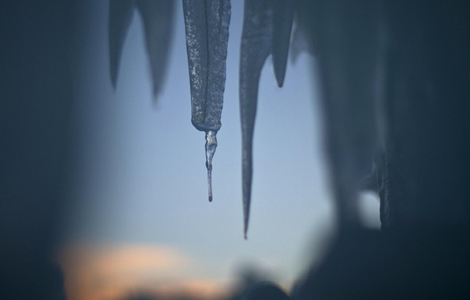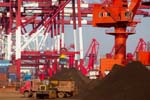Beijing air gets 'better' but still lacks target
Updated: 2012-01-09 07:13
By Zheng Xin (China Daily)
|
|||||||||||
BEIJING - The amount of tiny particulate matter in the air detected in the capital has been decreasing in the past 10 years, according to the city's environmental protection regulator.
However, the average reading for PM2.5 (particulate matter smaller than 2.5 micrometers) - a major cause of harmful smog - in 2010 in Beijing, was still double the target of 35 micrograms a cubic meter (cu m) set by the Ministry of Environmental Protection.
"As a developing country, despite the government's efforts in promoting the city's air quality in the past 10 years, China still has a long and tough road to go to meet the public's expectations," said Yu Jianhua, director of the air pollution control division of the Beijing municipal environmental protection bureau.
The average annual PM2.5 density in the capital decreased from 100 to 110 micrograms a cu m in 2000 to 70 to 80 micrograms a cu m in 2010, according to data collected by the bureau from scientific and research institutes based in the capital.
The average annual density of PM2.5 in Shanghai was 44 to 53 micrograms a cu m from 2006 to 2010, according to the Shanghai government.
The Beijing municipal environmental monitoring center started collecting PM2.5 data five years ago for research purposes, but hasn't accumulated any official data so far.
"Based on academic dissertations we have collected so far, the capital has witnessed a decline in PM2.5 density," said Yu. "We will continue collecting and releasing more detailed data to the public in the near future."
"Due to the different locations of air monitoring stations, the readings for PM2.5 might vary a little bit," said Yu. "But the data we collected show a clear drop of PM2.5 density so far."
In response to the official's claim about the decline of PM2.5 density in recent years, some residents expressed doubt.
"I don't see any improvement in the air quality in the capital in the past few years with the number of motor vehicles soaring," said Wang Yu, 26, a Beijing resident.
Many cities in China face challenges in meeting standards for a stricter index for gauging air quality.
Wang Qiuxia, a researcher at Green Beagle, an environmental protection non-governmental organization based in the capital, said it was a step forward since the readings for the pollutants could ultimately help control emission of the pollutants, by acting as a warning.
According to the bureau, the city will continuously improve the air quality by cutting down automobile pollution, reducing industrial emissions and further cooperating with neighboring cities.
"There are less than 5 million motor vehicles in the city," said Yu. "In congested cities like Beijing, incomplete combustion of fuel would lead to a tremendous increase in the density of PM2.5."
The government will further raise vehicle emission standards and use more clean energy, according to the bureau.
"To improve the city's air is a task requiring cooperation," Du Shaozhong, deputy director of the bureau, told China Daily.
"We should collaborate with neighboring cities" to solve the problem, Du said.
- Chinese tourists flocking to neighbor
- Nationwide rush for home kicks off
- Regional free trade talks in the pipeline
- WB chief economist optimistic of China economy
- Central bank suspends bill issue ahead of holiday
- Clouds on economic horizon: ex-trade official
- Buffett to welcome Chinese New Year in song
- Tea firms set to explore high-end int'l market









